Thursday, October 26, 2006
Like our kids, but not really
First, take out all the furniture: leave a few old blankets, a kitchen table, maybe a wooden chair. You’ve never had a bed, remember.
Second, throw out your clothes. Each person in the family may keep the oldest suit or dress, a shirt or blouse. The head of the family has the only pair of shoes.
Third, all kitchen appliances have vanished. Keep a box of matches, a small bag of flour, some sugar and salt and a handful of onions, a dish of dried beans. Rescue some moldy potatoes from the garbage can; those are tonight’s meal.
Fourth, dismantle the bathroom, shut off the running water, and take out the wiring and the lights and everything that runs by electricity.
Fifth, take away the house and move the family into the tool shed.
Sixth, no more postman, fireman, government services. The two-class-room school is three miles away but only two of your seven children attend anyway, and they must walk.
Seventh, throw out your bankbooks, stock certificates, pension plans, and insurance policies. You now have a cash hoard of $5.
Eighth, get out and start cultivating three acres. Try hard to raise $300 in cash crops because your landlord wants one-third and your moneylender 10%.
Ninth, find some way for your children to bring in a little extra money so you have something to eat most days. But it won’t be enough to keep bodies healthy, so lop off 25 to 30 years of your life.
There are, of course, many other things that are missing on this list: no health care, for example, which results in a variety of different diseases; no employment, and for those who do work, no salary for months on end; women generally have no say on how many children they end up having, which more often than not will mean a lifetime of bearing children and caring for them, etc., etc.
But while this is true about the vast majority of places in the CAR, you will also be surprised to see that a small minority, especially in the major cities, still enjoys access to some of the same amenities that we here in the West have.
For example, we were traveling through a little town and I noticed a line of young men outside a rectangular shaped building. I went in and was amazed to see a big screen with the most strikingly beautiful picture I had seen anywhere (much better than I have at home). They were watching European soccer and having a blast. You could hear the sound of the generator blasting from a distance, but once inside the young men were in a transe-like state, glued to every movement coming out of that incredible Panasonic screen. Don't ask me how they came up with the money for the ticket to get in.
In Berberati, the second largest city in the CAR, I had the best Internet connection in the country. Here, in a room with about eight computers, men and women took turns checking their e-mail and being connected to the rest of the world for $1 per hour. Of all the times I went there, there was never a free computer in the room. It was here that I also met a rapper who performed for me both in Sango and in French. I got him on my video camera and he put on quite a show. He told me that his idol was
"50 cent." I had only heard about "50 cent" a couple of times, but while traveling in the CAR, I noticed that he was bigger than life there. Young men in the markets proudly wear an entire "50 cent" outfit and can readily repeat some of his songs, in English! I also saw young men watching old footage of Michael Jordan's basketball days while he was playing for North Carolina.
At moments like this I thought: no matter where they live, young people are the same. But then our car would move on and I would see dozens of young men gathered along the roads, doing nothing; children showing signs of severe malnutrition, some with skin diseases so devastating that their hair was completely gone. Then, I would quickly change my mind: no, these kids are nothing like our kids, for no matter how hard they try, they may not have a chance to be here tomorrow.
Pastor Ivanildo Trindade
Tuesday, October 17, 2006
Outrage
Never had such strong words entered my mind as often as they did during my recent two weeks in Africa. Then I came home, turned on the television, and found so-called news organizations obsessed with the story of a disgraced congressman whose hypocrisy finally caught up with him on a spring morning. People were “outraged,” They were crying out for “justice.” They screamed for punishment as their teeth tasted the blood of the fallen man.
I am mad at some of the reasons why we get mad in this county. I am outraged that in the 21st century, when America can collect samples of the atmosphere from a drone thousands of miles up in the air over North Korea, people are still dying in Africa -- 6,000 per day -- from diseases that are totally treatable in the West.
Think of this: two twin towers, six Katrinas, in the last 24 hours. The equivalent of an entire village wiped out while we vacationed, slept, ate, went to work, and watched our favorite team play on television. I am tired of the tunnel vision of American television. I am sickened by the collective numbness of some T.V. news executives, who charge a high price to have this kind of “news” delivered to our homes 24-7. And I am embarrassed that we keep on buying this kind of product.
I just spent two weeks in the Central African Republic and my life will never be the same for it. When you witness the kind of suffering I did, all historical discussions about whose fault it is become meaningless. As a pastor, I am no longer interested in theological arguments about whether helping the poor is an integral part of the gospel or not. Our involvement is no longer optional. As long as there is a need, I will seek to make a difference, there is no question about that.
Now I know that there is a crisis of gigantic proportions happening in Africa today. People are dying from AIDS, malaria, diarrhea, parasites, and tuberculosis. They die from diseases that cost twenty cents to cure but they cannot afford to buy them. Twelve million children are orphans from AIDS. Many more will die if they continue to have no access to the medicines that can cure them. We would not for a moment tolerate this kind of suffering in the West or even in Japan. Why are we not outraged? Is it just because Africa is far away? Is it because we don’t know? Is it because the media insists on feeding us selective news, including high doses of political drama every night?
Please, don’t get me wrong. We should be outraged at a man who broke the public trust and preyed on our children. As moral people we should be crying out for justice. I am not questioning the wisdom of reporting such story. I question the insane repetition of the same story night after night while thousands of little ones are dying every day, often hungry, in a cold hut, without anyone to offer a prayer for them. I fear that more often than not we have been robbed of information that really matters and thus we go to bed thinking that everything is OK with the world.
NO! Everything is NOT OK with the world. And we must learn what that means, and how we can make a difference. Turn off that television and read information about the Darfur, if that’s what it takes . Buy only fair-trade coffee. It’s going to cost a couple of dollars more, but it is worth it. Sponsor an orphan from the CAR. Shop for one of those “product red” products. That will help combat AIDS in Africa. Go on a mission trip to bring relief for those who are suffering.
Channel your outrage toward something useful. In other words: stay outraged, but be on the move with a heart of compassion. And start acting today while we still have a chance to make a difference.
Pastor Ivanildo Trindade
Monday, October 09, 2006
Darfur and the CAR
First we need to know that this is not a Muslim against other religions type of conflict. The government, the rebels, and the militias are all Muslims. This is, however, in a broad sense, an Arab against non-Arab type of conflict.
Second, we need to know that the United States have called the conflict in Darfur a "genocide," although the UN has not gone that far. Millions of people have been displaced from their villages, as many as 450,000 may have died already, though exact numbers are impossible to have. For a comprehensive analysis and history of the conflict in the region, go here
As recently as August 28 attacks in the Darfur region (far western Sudan, bordering the Central African Republic, the Chad, and Libya, a region about three-quarters the size of Texas) were widespread, lasting for several days, and resulting in chaotic displacements, family separations, and many children who have disappeared. Hundreds are now feared dead, according the the UN High Commission for Refugees. Read story here
Darfur impacts the Central African Republic in a major way. First, Sudan has for all intents and purposes invaded the northeast part of the CAR with a proxy of Chadeans who are not living in caves waiting for the dry season to come in a month or so they can presumably join forces with a larger force of Sudanese puppets to try to topple the government of Chad and perhaps the CAR as well. These forces are rippling out from Darfur and have left this country in utter chaos.
Journalist Nicholas Kristof, from the New York Times, who traveled recently to the CAR, wrote on a column dated October 1, that "the north of the Central African Republic is now a war zone, with rival bands (some from the government) burning villages, kidnapping children, robbing travelers and killing people with impunity." He contends that if this kind of random violence is not stopped, "the legacy of Darfur may be that all of Chad and the Central African Republic will collapse into Somalia-style anarchy."
The human cost of this tragedy is mounting. Mr. Kristof speaks of visiting a hospital run by Doctors Without Borders, where a French doctor was treating Arthur Demongoy, a 2-year old suffering from severe malnutrition. "Children like Arthur," he says, "are heartbreakingly impassive; they are so starved they never cry, for every calorie goes to keeping them alive."
Though we didn't visit this area of the CAR, the description is eerily familiar. And I am convinced we must do all we can to try to make a difference. President Bush has called the tragedy in Darfur a "genocide." Why not ask the President to let the United States be more active in stopping this kind of genocide from spreading even further into the neighboring countries of the region. I would urge you to contact your representatives and express your concerns.
Pastor Ivanildo Trindade
Friday, October 06, 2006
Reflections of an American-African. By Pastor Tom Peters
This was almost a perfect African experience for our team. A lot of things that I remember experiencing either as a kid
 growing up in the CAR, or as an adult missionary, our team was able to experience in just a few short weeks. From the chaos of arriving at the Bangui airport, to the heavy tropical rains, to the near-impassable roads, to breakdowns on the road, to the incredible expanse of a clear, star-lit night, to the joy of worship of our Pygmy brothers & sisters in Christ, to the somewhat stoic worship of
growing up in the CAR, or as an adult missionary, our team was able to experience in just a few short weeks. From the chaos of arriving at the Bangui airport, to the heavy tropical rains, to the near-impassable roads, to breakdowns on the road, to the incredible expanse of a clear, star-lit night, to the joy of worship of our Pygmy brothers & sisters in Christ, to the somewhat stoic worship of some of our other African brothers & sisters, to the joy of a deaf-mute man seeing some long-lost missionary friends, to seeing some wild elephants, buffalo and monkeys. The only thing that the trip lacked to make it a near-perfect African experience is that we didn’t see any snakes or scorpions! Crikey, that’s too bad!
some of our other African brothers & sisters, to the joy of a deaf-mute man seeing some long-lost missionary friends, to seeing some wild elephants, buffalo and monkeys. The only thing that the trip lacked to make it a near-perfect African experience is that we didn’t see any snakes or scorpions! Crikey, that’s too bad!If you have been following our blog from the beginning, I earlier wrote about taking a picture of Albert (a recently deceased long-time friend and mentor) back to his wife, Anne. At Bata, I was able to present her with the picture and spend some time with her. That was really a neat experience. You see, when you talk after the fact to people in Africa about the funeral of their family member, there are usually some complaints about what should have been done differently or of someone who did not honor the deceased by their words or actions. But in this conversation with Anne, there were none of those negative comments. All she could talk about was that “Albert’s funeral gave joy to God.” What an awesome testimony! Albert left an incredible legacy for his family and friends of a man who loved God and lived daily for Him! It was an amazing few minutes that I was able to spend with Anne. Continue to pray for her and for her family, that they would not forget Albert’s legacy of walking with God.
As some of the other team members have written, we learned first hand about a lot of the work that is going on among orphans in the CAR, both by Grace Brethren International Missions (GBIM), and by ICDI. For me, it was really good to experience the difference between the “orphan
 care” that these two organizations are providing. Through this type of care local people through churches are empowered to care for the orphans among them. This is done through sponsorships from outside the country, which lessens the financial burden of caring for the orphans. But the spiritual and social development of the children is carried out through the people who have agreed to care for them.
care” that these two organizations are providing. Through this type of care local people through churches are empowered to care for the orphans among them. This is done through sponsorships from outside the country, which lessens the financial burden of caring for the orphans. But the spiritual and social development of the children is carried out through the people who have agreed to care for them. This is totally different from “orphanage ministries.” The orphanages we saw in the CAR didn’t seem to provide much individual
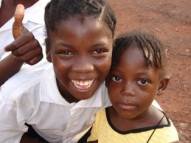 care to the children because of the shear numbers of orphans that the caregivers were trying to cover. The other problem we saw with orphanages was the fact that the amount of money that comes in to care for a large number of children has been too much for the managers of the orphanages to handle. They don’t seem to be able to keep their hands out of the treasuries of the orphanages, so the children are the ones who suffer. So, I applaud what both GBIM and ICDI are doing through their “Project Hope & Charité” and “Vision Trust” programs to empower local people to provide the care for the orphans. This is really effective and sustainable in the CAR.
care to the children because of the shear numbers of orphans that the caregivers were trying to cover. The other problem we saw with orphanages was the fact that the amount of money that comes in to care for a large number of children has been too much for the managers of the orphanages to handle. They don’t seem to be able to keep their hands out of the treasuries of the orphanages, so the children are the ones who suffer. So, I applaud what both GBIM and ICDI are doing through their “Project Hope & Charité” and “Vision Trust” programs to empower local people to provide the care for the orphans. This is really effective and sustainable in the CAR.One of the hardest things for me on this trip was to see the attitude of some of the people located at Yaloké. Sue, Mike, JP and I had spent the first two years of our ministry at this place and it had been a thriving ministry center. But after the rebellion in 2003, villagers had ransacked the ministry center and now those thriving ministries such as the hospital and the Christian High School are gasping for air. The worst part about it wasn’t the destruction, but the attitude of the local people. Instead of taking ownership of the ministries and really putting some sweat into getting the works back on their feet, the locals were basically standing around with their arms crossed saying, “Once the missionaries come back, then things will be good again.”
In contrast, Bata saw just as much destruction from the rebel troops as Yaloké had from the local people, but at Bata, they wasted no time in getting the Bible Institute and Seminary back on their feet under their own power. It was very easy, then, for GBIM and other churches & individuals to come along side the local leadership at Bata and join them in the ministries. At Bata, local ownership was very evident, so it was a joy to see the work there, although there is still plenty of evidence of destruction. Please be in prayer for the work at Yaloké; that the local people would see that God has given the ministries into their hands and that they need to be good stewards of what He has supplied to them as ways to reach their community for Christ.
I would like to close with a thought about the attitude of humble worship among the Pygmies that was evident to our team. At Bayanga, we were able to experience the joy of the Lord in a whole new way! Upon our arrival with the Swedish missionary, Tomas, the Pygmy widows expressed their praise to God through song and dance for not only getting machetes to help them in their work in the fields, but also for bringing Tomas and his guests safely to Bayanga. A day later, we were able to go to a Pygmy village where a water well had been put in and see their joy in worship at the clean water that was now provided to them.
 Later we were able to sit in the Pygmy church that was there and be humbled that, even with only logs for benches, the Pygmy people would faithfully come to hear the Word of God shared with them. It was very convicting to see that church, because many times we here in the U.S. complain about this type of music in our worship service, or the uncomfortable pews that we have to put up with, or that style of
Later we were able to sit in the Pygmy church that was there and be humbled that, even with only logs for benches, the Pygmy people would faithfully come to hear the Word of God shared with them. It was very convicting to see that church, because many times we here in the U.S. complain about this type of music in our worship service, or the uncomfortable pews that we have to put up with, or that style of dress that we may deem inappropriate for a fellow-worshiper to be wearing. For the Pygmies, take one look at their church and its benches and it becomes obvious that their worship is not about them; it’s about “KOMBA” (GOD in the Bayaka language)!! Perhaps we could learn a few things from our Pygmy believers that would put us in a true attitude of worship that is "in spirit and in truth!"
dress that we may deem inappropriate for a fellow-worshiper to be wearing. For the Pygmies, take one look at their church and its benches and it becomes obvious that their worship is not about them; it’s about “KOMBA” (GOD in the Bayaka language)!! Perhaps we could learn a few things from our Pygmy believers that would put us in a true attitude of worship that is "in spirit and in truth!"
Monday, October 02, 2006
The tale of two feet
One of the most striking contrasts I was able to register by pictures while in the Central African Republic was that of two feet that tread the same ground in Bayanga, the Pygmy area we were privileged to visit.
I notice the first feet the moment we entered the compound where a Swedish missionary family has lived for the last five years. I quickly surmised they were the feet of one of the missionary's daughters, a guess not too difficult to make, given that we were in the middle of Pygmy country and I knew that the missionary had five kids. I was struck by the beauty of the barefooted young girl who towered over the Pygmies she was standing side by side with.
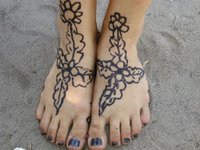
(the beautiful feet of a European young girl)
Later I noticed that she also had tattoos in her arms and neck, made from natural henna extracted from the forest. I also noticed that a couple of other local girls also had tattoos on their bodies, not a fashion statement, but a children's game, resulting from having few toys and much nature to explore around them.
I played with these kids for about an hour and eventually shot a picture of the beautiful feet that tell a story of places and privileges that only a Western can claim. These feet are well groomed, even in the midst of Bayanga. They are clean and follow an almost perfect parallel pattern, show no signs of wear, and point to places yet to be visited.
These feet have been in the jungle, but they also have been around Europe, they have skied in the Alps and entered stores and places of learning. These feet open the door of opportunities and speak of a great past and a promising future. These feet invite you to join with them if only to have yours look a little better than they are. They are the golden feet of an European girl living in the end of the world. They look beautiful anywhere in the world.
Not long after finishing with the kids, I sat with a group of Pygmy young men who were admiring pictures from a digital camera one of our team mates was showing them. They were being introduced to the world the first feet belonged to: videos of the trolley at Detroit International Airport, tall buildings in Paris, airplanes at Charles de Gaulle Airport, electricity, restaurants, people looking happy everywhere.

(the man with the foot made of "stuff of life," on the left)
It was then that I noticed the feet of one of the men sitting across from me. They looked swollen, shrunk, distorted and older than its "owner." I immediately thought of the beautiful feet I had just photographed. There couldn't be a more pictorial lesson on the contrast between those who have and those who don't have. The feet I was now seeing spoke of an extremely rough life, lived close to the ground, mostly uncovered, open to the elements, to the dangers of crawling animals, deadly snakes, and flying machetes. Those feet looked like they had been tortured, which they, of course, were, not by men, but by the harsh realities of nature itself.

(the feet that gave me pause)
The feet of this Pygmy man pointed to no place in particular, except the mud of the ground, the harshness of life in the forest. These feet spoke of no privileged position in the world, but of toil and pain and groaning and prayers that went unheard for so long. These feet opened no doors and repelled everyone who was within their sight. These were no golden feet but feet made of the stuff of life. These feet were covered by the thick layer of flesh that now coated what once was an unsuspecting normal looking member of the body.
If you look carefully (click on the picture to enlarge, if you wish), there is a fly on the foot of the young girl as well as on the one of the Pygmy man; but while the one on the beautiful foot almost seems to augment the already ornate feet, the one on the harsh looking foot only augments one's sense of repulsion. It speaks of unsanitary places where one would dare not to walk. The fly almost seems like a bad omen, quietly doing its part in the deterioration of this body part, which already looks to be on life support.
Yes, I have to admit that I did feel repulsed at first, but it didn't take me long to realize that these were the feet of a survivor from Bayanga. That thought gave me pause. I felt a sense of deep respect, being in front of someone who, albeit young, had already been through so much. I was humbled to be in the presence of a man who had not given up and was still standing in spite of all the odds. Yes, his feet may have looked ugly, his sandals torn, but here was a man who would not give up on living. And now some of those prayers had been answered, as he had a chance to hear the good news that God loves him as much as He loves the European girl with the beautiful feet.
Next time you look at your feet, even if they are not that beautiful, think about how privileged you have been to live, work, and have fun in this part of the world we call the West. Think of what you would do if you traded places with that Pygmy man. And think about what you can do today to alleviate the suffering of some of the poorest of the poor around the world.
Pastor Ivanildo Trindade
Thursday, September 28, 2006
Urgent: Bata station attacked by bandits!
I am traveling to D.C. and now Lynchburg, VA, where my daughter, Carolina, goes to school, and this explains the silence on this blog for the last few days. However, this urgent need came to me today.
Just a little over a week ago our team was at the Bata Station and now they have been assaulted by bandits. I want to ask you to pray for the many families at this station. Read the following e-mail from Francois Ngumape, the director of the schools there. Though the English is a little rough at times, I am sure you will be able to capture this brother's heart, as He seeks God's perspective and glory through all of this. Notice that his last words are "To God be the glory forever."
Remember: things were (and are) a lot worse than this brother is conveying here, so prayer is absolutely important!
If you want to write a note of encouragement to this brother, please send it to: fngoumape@uuplus.com.
"Dear Partner in Christ,
Sometimes our suffering is for God glory. He knows everything and is in control of every details in our life. Yes thank you for prayers. Quietness came back after one hour of turbulence. In fact I was in front of my house to 2H50 PM when I saw armed men to cross the campus by the median, the children ran everywhere. I ask people to calm themselves ..Some student ran and forbide me to be expose in the campus because the people I saw are bandits. They took 15 students, and beat up them to ask them to indicate them where they can find sugar. Then some started with entering and to search the houses all long their way.
All of the student took in hotage were beaten, some had some injuries to the back and on the head. Some have some pains to the level of their rating. Thanks God that there is no case of slaughter. It is to 4H05PM that they leave the campus and the village. Praise the Lord they didn'tÂ’t come to our home. Nor the offices have not been visited. They were very fast in their operation of stealing things in the houses. It is finally at 5H20PM that the soldiers of the CEMAC, state police and the CentralAfricann soldiers arrived to Bata, they pursued them during 1 hours in the bushm but didn4t found them and come back .
The state of the campus is quiet, the students have good spirits as well as the staff, even those that have been beaten up, had come for the session of prayer at 6H00PM to 6H30 .It is at 8H00 that we sent the van to look for more of 30 children of the students and staffs that end up in bozoum 7 miles for Bata in their running away from the bandits, therefore everybody is in the campus.
It is again another test that lets us perplexed, without knowing what to decide or to say now about the school. Your prayers are welcomes for us.
Thank you for your moral and spiritual support.
Fraternally in the ministry,
Dr. Francois NGOUMAPE
Doyen de la F.T.B.F.
B.P. 240 Bangui
Cell: (236) 05 41 58
A Dieu soit la Gloire à Jamais!"
Monday, September 25, 2006
The time to act is here now
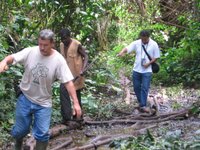
(one of the images I am hoping not to forget -- walking to the "river of death," where women treat their manioc, kids bathe, and all get water to drink and cook, a routine that could eventually kill them)
For those of you who have faithfully read this blog, we are not done wit it yet. In fact, I don't even know if we are going to be done, as long as we are fufilling a purpose. Thank you for your support and prayers!
Yesterday we met with the Global Task Force in our church. To a man (and woman) everyone agrees that we must act to make a difference. We got the same reaction from our pastoral staff. We have so many more stories to tell and will do so, but there comes a point where you have to say: "It's time to act." So here is our proposal for action.
First, let's eliminate all excuses.
There no longer exists the possibility that we can just sit on our hands. We know we can't solve every problem but we know we each can do something. The proof for that categorical statement is that in a country where children are dying because their parents cannot afford a pill that costs 20 cents to cure their malaria, everyone can do something. We can literally save a life with 20 cents. Don't tell me that you can't do much.

(a pharmacy in Bangui, where we verified in loco that the medicine that can cure malaria costs only $100 CFR's (or 20 cents)

(in this same location, a doctor from the C.A.R., with his Nigerian wife, work tirelessly and with little funding, to save people who are infected with HIV/AIDS. "Even when we send them home with the anti-retrovirus medicine," the doctor said, "what good does it do if they don't have food to eat at home?")
As we traveled around the C.A.R., we were overwhelmed by the needs. There is need for food, medicine, water, and education. There is need for the hope of Christ. There is need for hope, period. Since we cannot attack all fronts, we decided to focus on clean water and sanitation. We saw concrete examples of how these two areas are transforming villages, saving lives, and opening the door for the hope of Christ to enter.
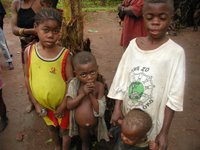
(no shortage of needs in the C.A.R.)
So, in the following year, it is our desire to help drill four wells at the cost of $12,000 dollars each. Two will be in the village of PAMA, with which we hope to extablish a partnership, and two others in two unreached Pygmy villages. We also hope to partner with at least 10 ABF's from our church to provide $2,500 each for community development. This partnership will allow us to build latrines, provide a variety of fruit trees to supplement the diet of village people, start micro-enterprises (such as building latrines, providing sowing machines to widows, machetes, and small loans to help some of our brothers and sisters start a small business selling things alongside the road, among many others).
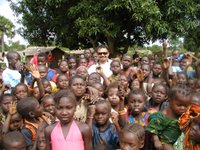
(children in the village of PAMA, where we hope to establish a partnership)
I know this does not sound like much, but if we achieve this goal, it will be nothing short of a miracle for us. This is not yet official, as it needs to be approved and bought on by our congregation, but we as a team are convinced that this is the direction God has laid on our hearts.
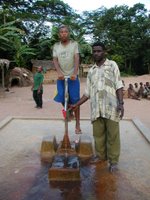
(a simple pump well, saving hundreds of lives at a Pygmy village in Bayanga)
If you want to hear more about these opportunities, come to New Community this Wednesday, September 27, at 7:00 p.m., and also to our "African Night," on October 7, at 7:00 p.m., where you will also have the opportunity to participate in a silent auction of artifacts that our team brought back from Africa. The proceeds will go toward helping the next team get to the C.A.R.

(a group of believers now exists among this remote group of Pygmies in Bayanga. A water well has opened all kinds of doors to share about the one who gives living water)
We can't wait to tell you our stories in person. Meanwhile, keep praying. The hard work has just really begun and we believe we need to go beyond the walls of our church. So we will go anywhere to share this vision. If you have a group of co-workers who get together for lunch, we would love to talk to them. If you want to do a neighborhood gathering in your house and invite your friends to come, we will bring a screen and a computer and share some of the stirring images from our trip. If you have relatives who need to be challenged to do something significant with their lives, we will do the job for you. Call us and we will come!
Pastor Ivanildo Trindade
itrindade@woostergrace.org
330-264-9459
Sunday, September 24, 2006
Clean waters and the living water. By Tim Harley
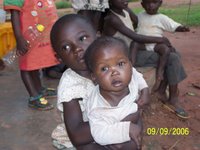
(children at risk, a common scene at the CAR)
I didn’t realize how hard it would be when God answered me. I saw despair and hopelessness in the lives of those we met as I had never seen before. Hunger and sickness overwhelmed many we saw. I felt anger as I learned of the constant injustices that occur every day. At times it was overwhelming, and I wondered, “Can I really make a difference or are we wasting our time here?” But God kept reminding me that He was bigger than any problems I saw and, and He loves this country.

(hope in the midst of despair)
I began to see hope through various ministries we were introduced to. The light of the gospel is piercing the darkness, giving people a chance to experience God’s love. Some of these ministries included orphan care, medical outreach, nutrition education, assistance for victims of AIDS, radio, and water well drilling for villages. The need for safe drinking water really stood out to me because of my own involvement in the water well industry. Safe drinking water is foundational to all societies. Our team saw first hand the impact good water can have on a village. The overall health improved drastically when contaminated water no longer was used.
One example our team saw was in a Pygmy village in Bayanga. This village traditionally used the water out of a nearby river for every day use. As a result, water borne diseases ravaged their bodies killing many, causing severe sickness in others. Survival was extremely difficult. This past year a water well was drilled for the village.
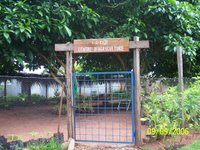
(signs of hope -- an agricultural center in Berbarati)
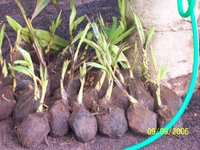
(trees are provided to cooperatives in villages to provide them with a variety of fruit trees to supplement their diets)
The benefits of this safe water have been undeniable. Certain illnesses were almost eliminated. Hope has been introduced to this village. The villagers sang and danced demonstrating their gratitude for the well. Jim Hocking shared with them. He used the story of Jesus and the woman at the well. He compared their old contaminated water to contaminated lives because of sin. Just like the well offered good health, Jesus offered the woman living water.
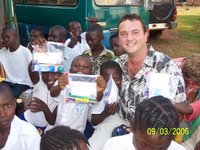
(Tim-- making a small difference, with the gifts to orphans provided by an ABF from our church)
As Jim shared this, I realized the powerful connection between meeting physical needs and meeting spiritual needs. It was so natural to bring the gospel into this village. The well offered opportunity for the gospel to be shared and in a way that was so clear and understandable to them. This was God on display before their very eyes.

(women working - a common scene all over the CAR)
It’s my prayer that God will use me to help pass the vision on to our church and community. The opportunity to provide other villages with good water is exciting. The impact could be eternal. It’s huge. Matt. 10:42 says, “If anyone gives even a cup of cold water to one of these little ones because he is my disciple, I tell you the truth, he will certainly not lose his reward.” I believe God wants us to give many cups of water in His name.

(Tim, with his new friends on top of the hill in Bessai, the birthplace of GBC work in the CAR)
I believe God has given us the opportunity and privilege to be a part of His plan in the CAR. I’m humbled to think that God, in eternity past, planned for our team to be in the CAR at this time. I’m also excited to see what He will do through our team and our church to impact the CAR for Christ. Eph. 2:10 says, “For we are God’s workmanship, created in Christ Jesus to do good works, which God prepared in advance for us to do.”
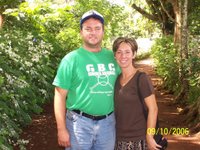
(Tim & wife Jeana, at the "Garden of Eden" in Gamboula, close to the Cameroon border)
Friday, September 22, 2006
CAR -- we can make a difference there! By Jeana Harley
God has obviously moved in your hearts and a part of you went with us in the form of your prayers. I want to start off by saying thank you for being sensitive and obedient to the Holy Spirit. What we experienced in Africa cannot be overlooked, put on the back burner or excused away as someone else’s job. God wants us involved.
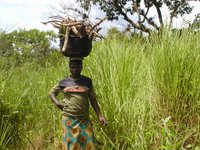
(women never cease to work in the CAR)
It is now our hope that you can somehow in some small way experience through us the severity and urgency of the needs in the CAR through pictures and stories and conclude in your hearts as we have that “…while we have opportunity, let us do good to all people…” (Galatians 6:10). For how can we go on living as usual in our blessed state here in America and not have it affect us? We must “not neglect doing good and sharing, for with such sacrifices God is pleased."
Having spent six weeks in the CAR many years ago, I was not shocked by the extreme poverty (extreme really doesn’t describe it either). I was prepared for the images and experiences we had. But this time I was there not as a single young woman but as a wife and mother. I began to look at the women in a different light because I could relate to them on another level. I looked at their workload and wondered if I could do that.
More often than not, it was the women cooking (an all day event), cleaning (not quite like we do though), walking to the river to wash dishes, bathe children and collect water to be carried back on their head while carrying babies on their backs and possibly some firewood or food. We often saw the men sitting idle around the fire in the family’s only chair. That would not excite me as a wife, but there would be no choice.
Then there is the daily experience of your children being ill, malnourished, and 50% of the time, dying. I began to wonder, “What would I do if half of my children died before age 5?” What joy would be robbed from my life? What sorrow I would have to live with? Perhaps living in survival mode 24/7/365 numbs them a little, but I doubt it.
I remember when our oldest was in the hospital needing emergency surgery when he was 22 months old. Had we been born in the CAR, he would have died. Then chances would be that one of our other two would be dead from diseases from drinking contaminated water, or from contracting malaria or the myriad of other unnecessary diseases that plague the country.
I don’t know why God chose for us to live here and not there, but perhaps it is for us to know what we know and to respond. God took me many times to I John 3:16-18, and I invite you to look there with me now. “This is how we know what love is: Jesus Christ laid down his life for us. And we ought to lay down our lives for our brothers. If anyone has material possessions and sees his brother in need but has no pity on him, how can the love of God be in him? Dear children, let us not love with words and tongue, but with action and in truth.” Let us be able to boast of the love of God being in us!
I want to share one experience in closing that I wasn’t prepared for. In Berberati we visited an orphanage. I had never seen such filthy living conditions. Had this been in the U.S., the place would have been shut down and those in charge sent to prison. There would have been such an uproar from the people for such atrocities. But here, the woman was doing what she could with what she had to care for the children.
I heard a baby crying. Later I found out she was only 11 months old. I found her lying on a mat on a cement floor. The mat was covered with green vomit, diarrhea, and urine. Her face was inches from some of it. A chicken had even vomited nearby as well. I went to pick her up and quickly realized she was wet with her own urine up to her shoulders. She stopped crying after I removed her soiled dress, her only covering, and held her tightly to provide warmth on that cooler rainy day.

(Jeana, holding little Michaela)
Eventually she began smiling at my funny faces and silly sounds. It might have been the first time she received eye contact from an adult. Our team had helped prepare some clothes for the children and after they were passed out, I put an outfit on her. I learned that her mother had died of AIDS and she, Michaela, probably has it too. The hardest thing in my life to do was to set her back down on that mat, say a prayer for her and leave her there to eventually die. At that moment I wanted to cry and scream out to God of the unfairness. Then I scolded myself for the thoughts that followed that she would be better off to die and be in the arms of Jesus than to live the life before her here.

(love language understood here)
I continue to pray for little Michaela. I pray for God’s intervention in her life. I pray that I will be able to accept whatever God allows to happen to her. But how many more have to die? How much longer will we wait to act? I know we can’t save everyone physically. I know that not all will be saved spiritually, but we must not grow weary with the task before us. We must do whatever God prompts us to do. We can make a difference physically and spiritually for some, and to those it will mean all the difference. And then we can praise God and give Him all the glory and honor for what He has done in and through us. What a privilege it is to sacrifice for the Lord.

(Jeana, with her husband Tim, at Charles de Gaulle Airport in Paris)
Thursday, September 21, 2006
The Central African Republic -- a country of hope and despair. By Dave Slater
Dirt floors are the norm everywhere and you have to assume that the people must be cold at night. You then find out about the limited availability of good, clean water. Most water is taken from nearby streams that are also repositories of other things since the overwhelming majority does not have the luxury of outhouses or latrines.

(a typical dwelling place in the CAR)
Good and varied nourishement is lacking. The main food is gozo, made from manioc roots. Health care and education are scarce due to lack of funds and professionals, and to top it all off, AIDS is devastating the country.
As depressing as that may appear, there are pockets of hope that can grow through missionary assistance and dedicated CAR citizens. Even though most people live in dirt floor huts, they are very friendly and respond to our waves and handshakes with smiles and enthusiasm. ICDI is drilling wells in villages to secure clean water. At these villages there is a marked decrease in water born deseases that have affected the children in the past.
Another mission has started an Agri-forest Research Center, where fruit trees and certain vegetables are available to villagers to plant and take care of in order to supplement their diet. Nutrition programs are attached to health clinics to teach mothers what good nutrition is and why it is so important to keep children healthy.
Schools and clinics are being built in order to educate children, who are CAR's future, to to help keep the population healthy.
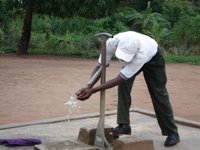
(a village well, the difference between life and death for hundreds)
It is important to note that while these programs use outside funding, the work is largely done by CAR citizens in order to teach leadership skills and to encourage local owenership in the program.
Evangelism ties this all together as CAR workers in these places of change are touched by the love of Jesus and pass on the salvation they have in Christ to others, in order to take their country from despair to hope.

(on left, Dave Slater)
Wednesday, September 20, 2006
Pictures that tell stories
Tuesday, September 19, 2006
What impacted me the most about this trip. By Jana Slater

(Poverty that leads to death through malnutrition -- look at the orange color of the little girl's hair, a sign of worse things to come)
There is no such a thing as making a living here. People are barely eking out an existence. Most places do not have electricity or water. It is a matter of day to day survival and people are exhausted because of it. The government is very unstable and there is no infrastructure in place to help the people.
There are only 25 operating businesses in the whole C.A.R. Because of people getting water from the rivers for drinking, cooking, washing, etc., water-borne diseases run rampant. Intestinal parasites, malaria and TB are prevalent in the whole country and these diseases are killing people daily. The main staple is gozo (a manioc root) which has almost no nutritional value after it's cut-up, ground, and boiled. There is also poisonous chemicals that have to be removed from the root before one can eat it.
Many, many children die of malnutrition before the age of five. Fifteen percent of the population has HIV/AIDS and it is imperative to reach the young people and educate them about the disease so we can stem this pandemic. There are many ways that we, as a church, can plug in and it is required of us. In Matthew 25:40 Jesus said: "Whatever you do for the least of these brothers of mine, you do for me."

(Jana Slater, with husband Dave, at Charles de Gaulle Airport in Paris)
Monday, September 18, 2006
We made it back!
After approximately 30 hours between flying and sitting around at airports, we were ready for bed. Most of us had to be back at work the next day!
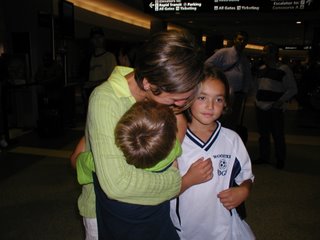
(Jeana, getting warm hugs from her children at Cleveland Hopkins)
There were only a couple of unexpected things that happened during our trip. One was that the two couples, for some unexplainable reason, except the grace of God, got upgraded to first class on the flight from Bangui to Paris. What a gift. Pastor Tom and I thought that they were going to upgrade us on the Paris-Detroit leg, but we waited in vain!
The second unexpected (but not surprising) event was that three of our luggage pieces never made it to Cleveland. As of yesterday, they were still at Charles De Gaulle airport in Paris. Please, pray that they will be delivered soon.
This blog will remain open over the next few weeks, so keep on checking and tell your friends. There is so much we want to share and now that we have access to fast computers, we will do the best to tell our story with all of you who have so diligently prayed for us.
Thank you for your prayers!
Saturday, September 16, 2006
The long commute of the extremely poor
We made the long journey from Berberati to Bangui in thirteen and a half hours. It took longer than we had anticipated because both cars were having trouble. The red Nissan I was riding on had a radiator leak and we had to stop every thirty kilometers or so to add some more water to it. But thanks to God we all arrived safely and were greeted by a hearty and delicious meal prepared by one of our GBC missionaries here.
We figured we traveled about 2500 kilometers in ten days. I haven’t done the math, but I think it is just under 1800 miles. This may look like nothing to someone in the US who is used to nice roads and rest areas all along the way. But considering the conditions of travel here, this was no small feat. We are thankful to God for all we saw, sensed, smelled, heard, and touched. Our lives will never be the same because of this trip.
Driving into Bangui at night gave us another picture of the daily struggles of people living in extreme poverty. Because of the scarcity of firewood near the city, thirty miles before we arrived in the city we began to see people pushing their carts with firewood (in some cases, entire tree trunks and small logs). Sometimes the volume in the carts rise to the skies as strangely distorted sculptures, a tribute to the injustice that reigns in this world. That is the daily commute of the poor. While we in the US commute to and from work, those in extreme poverty commute from work to work.
Before sunrise they leave for their gardens and as the sun goes down they make the long trek home, often exhausted, often without food in their stomach. Mothers return with small children, all walking single file alongside the road. They have no respite, no one to give them vacations, no hope for a life outside of the one they have known for generations.
The extremely poor know no amusement park; they have no one to entertain them and don’t have time to get bored. Some of the privileged few who have enough in this country see the poor only as masses occupying space. They are a nuisance to be ridden of, no more than noise problem and visual pollution. The poor are like trash that needs to eat and drink and settle somewhere. The poor are a major distraction for those who want to be left alone with their goods. They have no names, claim no possessions, know no ages.
God hates this kind of injustice and He has punished cities, towns and nations in the past because of the way they treated their poor and dispossessed. Oftentimes we think that God destroyed Sodom and Gomorra because of the sexual sins prevalent in those cities. While that is the emphasis in the story, in a way, that was only really “the sin of the week,” as there were many other terrible things happening in those towns, including the way they treated their poor. God gave them time to repent and then suffered their evil no more. The same was true with the nation of Israel. Check out Deuteronomy 15.
We, who live so far removed from the extremely poor in Africa, should not think that we are excused from taking action. As followers of Jesus Christ, we have no excuse. We have become aware of the predicament many of God’s children find themselves in. We have the Biblical admonition to help the poor. God mentions the poor 2003 times in Scriptures. It is one of the major themes in God’s Word. I am convinced that we are running out of time to start caring and sharing from the abundant supply that we have with those who are less fortunate than ourselves.
We are coming home with specific ways we can all help alleviate suffering in this part of the world and give the hope of Christ to a country that has been forgotten by the powers that be in this world of injustices. I hope you will be moved to action. God would be pleased with that.
Pastor Ivanildo Trindade
Bayanga, love it or leave it
We are back in Berberati after a brutal day of travel. It took us 10 hours on the road to get back. We had a bad storm last night so the roads were slippery, treacherous, and impassable at certain points. One of the cars had injection problem three thirds of the way here, so we had to stop a lot. Thank God we were traveling with people who know how to fix cars, including the two African men who went with us.
Jim had told us to make sure we took one spare pair of shoes and socks and now we know why. Don’t let the smiles fool you: we were dead tired and ready to hit the sac. Today I feel my whole body aching and the sensation that I had been hitting the waves at some beach is with me and probably will be all night long.
Not only are the roads slippery, they have some big ridges that can be on any side of the road, or the middle, and they change direction often. Time and again you don’t know until you hit that you are falling into a big ridge. Water prevents you from seeing holes and judging which side you should stay on. We are very thankful that we all made back safely here and are getting ready for another 9 hours or so on the road tomorrow, as we head to Bangui, then on our way to Paris. Even though the roads to Bangui are not as bad, we ask you to keep praying. Your prayers have made a difference for us here!
I am still amazed that we were able to make that far into Bayanga country. Meeting Thomas and his family was one of the richest experiences of this trip.
Bernadine, the man on the left, is the main evangelist. He does not have a salary. He tries to earn some money by fishing in the big river where we took a canoe trip yesterday. Two of his seven children actually caught the two tiger fish we ate during the time we were there. Bernadine loves the Pygmies and had led many of them to the Lord. He is the one who leads the prayer meeting at the station where we stayed every day at 5:30 in the morning. You can hear his voice singing, then you hear him come to God in prayer every day. It’s a wonderful sound as you wake up in the morning. This man has a calling from God and his example inspired me to continue to serve God with all my heart.
I had so much fun with these kids and they seemed to enjoy this foreigner as well. I watched them play and saw the beauty of the innocence in childhood again. For these kids, there is no difference between black and white, African and European, Pygmy, Swedish or Central African. They were all one and had no care in the world.
The river I swam on reminded me so much about my childhood, except for one thing: I wasn’t too excited later on when I met one of the Pygmies who hunts pythons with his bare hands and a machete. He told me he caught one right on that same river I was swimming on a couple of hours later. In all fairness, Thomas had mentioned that there are snakes on that river, but hey, I couldn’t pass up the opportunity to be a child again!
Your prayers are carrying us here.
Pastor Ivanildo Trindade
Sights that speak

You would think this beautiful little girl was posing for me, but she was just shy. If you look carefully, though, behind her cute smile and apparent picture of health, there is a tragic story. Her hair is orange, showing signs of malnutrition, which we have seen so often here in the CAR.

At one of our stops along the road, all these kids wanted to smile for my camera. Take a look at God's beautiful creation in Africa! You can see one of ICDI's cars in the background. We've been practically living in them recently. We were on the road 8 out of 10 days.
All in Bangui, all in one (sore) piece
We spent about an hour this morning (Saturday, September 17) at the Air France office, checking our luggage and getting our seat assignments, formalities with custom officials, etc., so we are now ready to get on that plane tomorrow. I am writing this quick post and hope to do more this afternoon with pictures. I have so much to do before we leave, including some interviews with orphans this afternoon. Please, pray that all the work that needs to be accomplished will be accomplish, for the glory of God.
Pastor Ivanildo Trindade
Thursday, September 14, 2006
Everyone is well
We arrived in Berberati around five this afternoon, after a BRUTAL road trip. I will tell you more later. We leave for Bangui tomorrow morning and I hope to post some pictures from there.
The important thing is that everybody is well and God is continue to work in our hearts as we meet people here and hear their stories.
Keep praying. Those prayers kept us safe on the road today, I have no doubt.
Pastor Ivanildo Trindade
Wednesday, September 13, 2006
God at work among the Pygmies
What an incredible day we had today. We got up at 5:30 and were on our way
to the World Wildlife Foundation. They have a huge project here and we were
encouraged to go see it while here. We got two guides, drove for one hour
and twenty minutes into the rain forest through narrow roads, huge
mudpuddles and with many tree limbs castigating our windows.
After that we got one more drive and proceeded to trek through the forest
for about two and a half hours in a big circle. We saw some elephants, not
too many of them, a herd of water buffalos, with about twenty of them, and
some gorillas. We came back to the starting point and refreshed ourselves
under a waterfall.
In the afternoon I played around with the little kids in the station here.
There are two Swedish kids (brother and sister) and several children of the
Pygmies who live here or whose parents are attending training here. There is
a creek on the back of the property and I swam with them for quite a while.
Then I played soccer with some of the boys. We had a lot of fun, even though
I didn't understand them and they didn't understand me. I found that even in
this end of the world the kids knew the names of all the Brazilians on the
national soccer team.
Around 4:00 p.m. we went out to the river, where we circled around a board a
big dugout canoe. The river and the vegetation reminded me so much of the
island I lived on until I was about seven years of age.
We left from there to visit a couple of Pygmy villages that have benefitted
from the well drilling work of ICDI. The group we spent time with are the
Bayakas. They are a minority group of Pygmies who have had a turbulent
history of relationship with the Central Africans. Some of them are stil
enslaved by other people, so this group suffers from a sense of
worthlessness that is very hard to overcome.
They do, however, interact with other people and somehow someone has to help
them enter into the 21st Century. We met with an American who married a
Pygmy lady and has lived here for over 20 years. Though he was not open to
the work of missionaries before, because of the work of ICDI, he has begun
to see the importance of God's work here. He thanked Jim in our presence for
the well that was drilled in the village and gave testimony that people are
not as sick as they used to be. There is still overwhelming needs, but these
people have taken the first step with the well. And they are also receiving
the hope of Christ.
We sat inside a crude building that serves as the church in this village. It
is completely built of bamboo material, including some of the benches, but
God is at work there. They have a local evangelist and several lay leaders
who have come to know Christ and are giving witness to the power of Christ
in their lives. One man leads a prayer meeting every morning at 5:30 with 20
or more peple present. What a testimony to their zeal and dedication to the
Lord.
Sitting on those pews I couldn't help but think that I was sitting where
some of God's most faithful people sit. They still struggle to eat every day
of their lives. They are still sick. Their children still face the real
possibility of not living pass five, but the joy of the Lord, the zeal for
God, the fervor in their worship serve as an example to us who once perhaps
had this kind of love but now have lost it.
Tonight I prayed that God would restore to His church in American this sense
of fervor and dedication. I prayed for spiritual awakening and revival. I
hope you will pray that prayer with me as well.
We hit the road again at 6:00 a.m. tomorrow, back to Berberati. It will be
another arduous day, but based on what we saw here in Bayanga, I can tell
you that it will be all worth it.
Keep praying!
Pastor Ivanildo Trindade
Tuesday, September 12, 2006
The longest short distance trip of my life
This was definitely the most arduous day for us so far. We left at 5:00 from
Berberati and arrived in Bayanga at 4:00 p.m. This was only a 170 mile trip,
but due to the road condition, it took us 10 hours to get here. This was a
record breaking for such a short trip! Along the way, we saw savannahs,
rolling hills, beautiful blue skies and lots of rain.
We also got stuck twice on the muddy roads, the last time we all had to help
and we only got out because one truck pulled the other. We were basically
all covered with mud all over, but thank God we arrived here safely.
Our host is a Swedish missionary couple who has been on this location for
five years. They built a couple of houses here and some classrooms. The
Pygmies come for six weeks at a time and receive training for leadership and
evangelism. Then they go back to their villages and practice what they have
learned.
They have started 12 churches in this area, half of which led by Pygmies and
the other half by Central Africans. We stopped in one village where ICDI had
a project to clean and prepare a natural spring for people to get their
water from. We met the pastor, a young man who is obviously in love with the
Lord. He had baptized 15 people last Thursday and was glad to share that
information with us.
We went down to the site where the spring is located, a little trek (400
meters), going downhill. There we learned the story of how the entire
village of approximately 200 people came together for two weeks to work on
the spring. This project cost about $2,500 and the end result is that a
couple of hundred people now have clean water to drink and cook with. The
people are also healthier than in some of the villages we have visited.
The story of how the work in that particular village got started would take
another post on this blog. For now, let me just say that the missionary
brought a team who showed the Jesus movie with great difficult. Three bulbs
burned on the projector and the last spare one burn right at the time when
Pilate was going to give the answer as to whether Jesus should be crucified
or not. The missionary had to tell the rest of the story but no one was
disappointed. They all came forward when given an invitation to accept
Christ. About thirty of those people stuck to their commitment and form the
core of the church in that location now.
If there are "ends" of the world, Bayanga is one of them. The people who
live here, and especially the Pygmies, are the least of the least. They have
been forsaken by everyone, except by God. I marvel at God's plan to bring a
family from Sweden, a couple with five children, to leave everything and
follow Him to bring the good news to those who are treated like dirt. God's
heart for the least of these never ceases to amaze me.
Praise God with me for people like Thomas and Lena. Their example should
inspire all of us!
Forgive me again for the typos. I am composing this under a fading 12 volt
system light, and don't have much time to check the spelling. Jim is getting
ready to send it via a satellite phone. I also know that in the transmission
process, the paragraphs break up in a funny way. I hope you understand. Keep
sending those comments!
We are all well.
Pastor Ivanildo Trindade
Monday, September 11, 2006
Being a kid in the CAR
I want to say a special greeting to all the students from the Wooster Christian School who are following our blog. Thank you for your interest in our trip and for praying for us.
Life in the CAR for children is not the same as in the U.S. Everywhere we go we see kids of all ages working. They help their Moms carry water and firewood, and they work on their family gardens. Here is a picture of a little girl we met at the station where we were staying. She was carrying wood for her family.

Notice that she is not the only one helping. Notice also that she is carrying a little doll that was more than likely made outside the CAR. Kids here are also like kids in the U.S. in the sense that they like to play. Kids everywhere love to play, but kids here in this country don't have much time to play. They have to learn to survive early on, and they have to make their contribution to the family.
It's rare to see a child with a doll like the one we see in this picture, but that doesn't mean that they don't know how to play. They build these toy cars with sticks and strings, like the one you see me playing with on the next picture.

Kids here in the CAR, more than anything, need hope. They need to know that somebody cares for them. The schools in this country don't work, the possibilities of them going to school are very slim. Girls especially are given to marriage at a very early age. They need all the help they can have and you can start helping by praying for them every day. Pray that they will find Jesus, first of all, because it is only through Christ that they can have hope.
Tomorrow we will leave early to Bayanga, the Pygmy country. I will not be able to do pictures from there, but will try to send e-mail updates to our blogs. We will be back on Thrusday. We will be on the roads all day tomorrow.
Please, keep praying. We are all healthy. We miss all of you. Thank you everyone who has left comments on this blog. Unfortunately, I don't have time to respond to your message, but I am reading them, and they are very encouraging. Wish more people were leaving messages, though!
Pastor Ivanildo Trindade
P.S. Sorry for the typos, I am on a tight schedule here.
Garden of Eden
We arrived in Berberati yesterday, September 9. This is the second largest
city in the CAR. It is not much by U.S. standards, but there was a nice
Internet Café and access to more goods than what we have seen since we left
Bangui last Tuesday.
We attended a Grace Brethren Church this morning, where Pastor Tom preached
in Sango. He had everybody's attention and the message was on getting rid of
the exterior things, checking our true motivation, and seeking to serve God
truly from our heart. The people truly enjoyed him.
After church we had a late breakfast and then hit the road again. Once again
we faced the dusty roads, this time not as dusty because it had rained the
day before. There were muddy stretches that only the four-wheel drive could
handle, but after a couple of hours we arrived in Gamboula, only ten miles
from the border with Cameroon.
We are staying at a very nice facility belonging to the Swedish
missionaries. They served us lunch and supper and we enjoyed a simple but
meaningful worship service tonight with them.
This afternoon we toured the extensive agricultural project headed up by Roy
Danforth, a missionary who worked in the Congo, then had to evacuate in
1998, and has since been in this part of the country, planting fruit trees
and training Central Africans to plant a variety of trees that can provide
them with nutritional options to the usual manioc root that has very little
protein and a lot of other things that are not good for them.
Roy showed us tropical fruits from around the world, which they are
cultivating, experimenting with genetic manipulation (to a small extent),
grafting, and sharing their knowledge with people in the villages who create
their own cooperatives and start planting trees for their own benefit. The
experiment has already yielded much fruit, no pun intended. As Roy said,
"their smiles are broader, and their children are not getting as sick as
they used to." Roy calls this project "Garden of Eden," and the name could
not be more appropriate.
Needless to say, I felt like I was back in the Brazil of my childhood, as he
was showing us all these fruits that I was so fimiliar with back in my
childhood days. We ate jack fruit, passion fruit, some nuts, and inga, which
is native to South America. I was able to identify several species and had
an immediate bond with Roy.
I admire the work of people like Roy and am praying to God that we as a
church will get the vision to come alongside people like him to make a
sustainable difference in the lives of people in this country. He has shown
me that we can do a lot with a little investment, and I want us to take
steps to do just that. Through this effort, many people have also come to
know the Lord, including some Fulanis, a nomad group of people who are
ethnically Muslims, but in some cases are open to hear the Gospel because
they have benefited from the fruit tree project.
Please, pray for the rest of our trip. We go out to see a couple o the
cooperatives in the villages tomorrow. At one o'clock, local time (we are
five hours ahead of Wooster), we will drive back to Berberati, stay there
overnight and then drive to Bayanga country, where a lot of the Pygmies
live. Please, pray. Some folks who made that trip recently have told Jim
that it took them 11 hours one way to make that trip recently.
We are getting a little tired and I am feeling like I am catching something.
It was a little rough today traveling on those roads. Pray that we will all
remain in good health.
Thanks for your prayers!
Saturday, September 09, 2006
Collecting stories in Africa

Most of the time, I end up missing important stories.
For example, I saw a woman on the side of the road with what appeared to be a song book, singing by herself while she and a whole group of people waited for a truck that had broken down on the road. I wish I could have stopped and chatted with her to find out what series of circumstances God brought into her life that allowed her to sing as she waited and not argue and complain as many of the others seemed to be doing.
I also saw a man walking with tremendous difficult on the side of the road, with the help of a cane. He didn't look that old, but it it was apparent he either had had Polio or had the unfortunate experience of eating manioc before the poison was totally removed from it. There would be so much value in learning his story, but we simply could not stop the car and ask him: "This crazy pastor from the U.S. wants to know what caused you to walk the way you do!"
Yesterday I saw a young man kick a younger, very beautiful girl at the little stand where we bought barbecued meet for one of our lunches on the road. He did this and the rest of the men there laughed. The girl just ran scared to the corner of the stand. The guy appeared to be high on something. Besides wanting to give him a hard time (to say the least...), I did want to find out more about him and the girl. Was she his wife or girlfriend? Did they even know each other? I also saw a little girl, probably six years old, run out of her hut, scared to death, as her mother chased her while brandishing a machete. I wondered what the future held for that little girl...
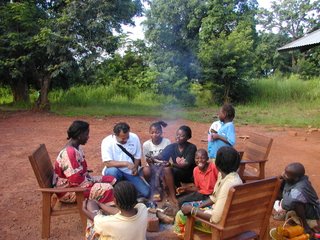
Once in a while I am able to get a story that touches my heart more deeply. Today I interacted with a maid who had this type of story. She had nine kids, seven of which still living, the oldest, a girl of seventeen years of age. You look at her and you would never think she has had that many children. She is fit and strong for someone who has lived so much and been through
hardships that most of us can't even imagine.
She had to literally flee from her husband in the middle of the night, putting her kids in a car and going to live in another city. Unfortunately,this is another case of someone who had no one to defend her. Because of her husband's drinking and sleeping around (she recalled his affairs with 28 women!), she was forced to leave him. She received no support from her local pastor,
church, and even the authorities. The authorities actually told her that she was a woman and she had no rights. Her husband had the right to keep all the children and to everything also he wanted. She had no option but flee. Praise God a missionary family with with whom she had connections gave her a job.
You have to admire this woman's courage. She is working as a maid, making about $60 dollars per month, is renting a house (paid for by her employers), and she has a couple of seizable gardens that help her provide food for her large family (her youngest daugher is about one year old). She
has all her kids in school and is well respected by everyone who knows her.
Througout my conversation with her, though, she kept repeating the phrase: "God is enough for me and my children." People like this poor African woman should stand at church podiums in the U.S. and teach us about real trust when everything around us does not make sense. I am humbled to learn that they exist somewhere in this world and am blessed to be within an earshot of their stories for two weeks.
A Day in the life of women in Central Africa
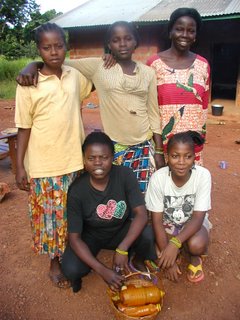
For hundreds of miles, as we drive our cars on muddy roads, we see people waking on the side of the roads, carrying loads, both hands occupied and heads holding the weight of daily provisions, if they are lucky to have them. A few men carry heavy tree limbs (or even trunks) on their heads, but it is mostly women who do that back breaking work.
In fact, just about the only time we see people with unoccupied hands, is when we stop at a market in a local village or a small town, and they are usually young men with nothing to do but joke around with each other and hope that the next foreigner will give them something for free. The rest of the people, the great majority of which being women, are spending their whole time securing wood, tending their gardens, carrying little ones on their backs, and doing all they can to survive.
Women and little children are the two groups I feel mostly burdened about here. Everywhere you see women burdened by the daily task of surviving. They have many children (a family with 6 children here is considered a small family), carry water and wood, sometimes from miles away, cook, defend their little ones, and try to secure a marriage to their daughters. What is required of women in this country is more than a human being can possibly do. No wonder the life expectancy for women here is only 43.

But you would be wrong if you thought these people wear their suffering on their faces. The reality is that most people have a ready, beautiful smile, and are eager to respond back, with both arms raised, when we wave at them from the windows of our fast passing vehicles. We hear their heart felt "merci!" every time we acknowledge them. Many of them actually look surprised that someone would actually acknowledge them. I cannot help but think that my Jesus would not only wave but sit down with them around their fires and give them words that would lift them from the burdens of dail survivor.
Thankfully, we are also able to sit and hear their stories. In fact, as I close this already too long post, I am about to sit down with a lady who has a story of survival of her own. I hope to share with you more about her in one of my future posts.
I am writing this from Berberati, where we arrived yesterday, after being on the road basically the whole day. We arrived here safely and were welcomed by the ICDI team here. There are two missionary families living on the compound here and they treated us to a wonderful dinner and we had real showers and a real toilette for the first time since last Tuesday.
Keep praying!
Friday, September 08, 2006
Leaving Bata to Berberati
Today is Friday, September 8, and we are just finishing breakfast a little
before 8:00 a.m. We are leaving again to a town two and a half hours away,
where we will meet up with Jeana.
Yesterday was a busy day for our team. I spoke at the chapel packed with
Bible Institute and Seminary students. Most of the rest of our team worked
on the projects that we had started the day before. They were able to get
the solar panels to work, which means that some people now have water in
their houses.
As far as the electricity, though, after many attempts, they got the
generator to generate electricity, but there was a discrepancy between the
American generator that was donated by a church to the school here and the
European installation and wiring system. As a result of this, and other
stuff I wouldn't be able to explain, they are not able to get electricity to
the houses, offices, etc. We were all disappointed, but I am sure they were
more so than we did. Jim will try to get some other equipment here in the
future.
We will be going on rough roads again for about nine hours, all the way to
Berberati, the second largest city in this country. We should be able to do
the "regular" Internet thing there, I am hoping. I am dying to share a
couple of pictures with you all.
We have learned so many stories of people here who sacrifice everything they
have to serve God. We are indeed humbled to sit among some of God's mighty
warriors for the sake of Christ, who look nothing like warriors when you
first meet them, but as you listen to them, you realize that you are walking
in the midst of giants.
We are honored to be here serving God.
Wednesday, September 06, 2006
On the road again
Here I am sitting by a fire under a beautiful moon in the middle of Africa.
Today was another full day of travel and work. We left Yaloké early this
morning, after touring the mission station there. We saw the remains of some
of the buildings that were looted during the war in 2003. That was a heart
wrenching experience, as we saw the hard work of so many for so many years
completely destroyed. In the midst of our tour, God reminded me that the
real work is not the building but the people whose hearts have been
transformed by the power of God through all these years.
We went to a little agricultural site where a project in Yaloké, where a
couple of people run a pilot educational program to educate people on
growing fruit trees that will give them better nutrition. I walked into a
room with dozens of bags of wheat that are donated to people who are
struggling to have enough to eat on a day to day basis. I cried as I entered
the room because it reminded me of the time I was a child and that was the
only regular food we got. The smell reminded me of those times.
We traveled about 54 miles to Bata but stopped many times along the way. One
of the stops was to visit a the tomb of a young 24 year old by the name of
Allan Bennet, one of the pioneer missionaries in the CAR who was here before
there was even a mission station in this country. What a telling story about
the dedication of such a young man to one of the most difficult works anyone
has ever been called for.
We arrived at Bata around 2:00 p.m. and went to work. Our teams split two
ways: some helped install a huge generator, others repaired a solar panel.
Tomorrow, Lord willing, the Bible Institute and the Seminary will have
electricity for the first time in three years. They have 55 students and
about 10 faculties and they all live here with their large families in small
dormitories.
My most inspirational story today was about the 60 young people who go to
High School in another town, located about 7 miles away. They are the
children of students at the school here. They walk to and from school every
day, an hour and a half each way. What a challenge for our young people in
the U.S. I will certainly tell that story to my kids.
We are doing well, though Jana is a little under the weather today. Karl is
feeling much better and Jeana is joining us tomorrow, Lord willing.
Please, keep praying!
Tuesday, September 05, 2006
Driving in the CAR
When you travel on road in the CAR, you have to expect the unexpected. Some
of the roads seemed impassable, but somehow we managed to pass them all,
through makeshift bridges, murky "ponds" and many villagers waving to us
with big smiles on their faces.
We traveled about 200 miles today toward the north of the country. We made
several stops, so it took us all day to get to Yaloké, and then to Pama, a
village of 2000 or more people where a Grace Brethren pastor labors among
some of the poorest of the poor.
Most of us are doing well, except for Jeana, who was left behind in Bangui
because she is still battling some kind of virus which she got in the U.S.
prior to coming here. Also, one of the pastors from North Carolina, Carl,
was sick most of the day, but he was able to make the trip. Please, pray for
these two. Jeana is planning on joining up with us on Thursday, and Carl and
Mike will be driving back to Bangui in Friday.
I am sitting under a kerosene lamp in the guest house at Yaloké. There is no
electricity here. We just returned from our trip to Pama and are trying to
get ready to sleep. We leave at 9:00 a.m. tomorrow to _______.
Being here in Africa is like going back in time to my childhood days. The
vegetation and the landscape is so much like my home in Brazil, the fruits
are the same we eat in northern Brazil, and even the manioc and cassava
plants are the same. The people are extremely friendly and they love to
interact with anyone. This is like being among long time friends, except
that I don't speak their language.
There is, however, another huge difference, and that is the fact that the
suffering here is so much more prevalent than what I remember when I was a
child. The pastor and his wife have eight children and he is also taken care
of several orphans. One of the pastors in our group asked him: "What is the
biggest challenge you have in your church?" His answer was unmistakable: "My
biggest challenge is having enough food for my family?"
There are 55 orphans in this village and only 35 of them are receiving some
assistance, namely, food, from ICDI. The rest are also starving, together
with the people they are living with. Most of them could go to school, if
they had the funds to do so, which amounts to approximately $40.00 per year.
Yet, the smiles on the faces of these people I will never forget. I saw in
their faces, again, the face of my Lord. They were dressed in filthy rags,
but I was thrilled to have my face touched theirs. They had not showered in
a long time, but their warmth was so contagious. I just wish I could stay
longer with them and I pray to God that we will be able to do something to
help in the future.
Forgive me for this post being so wordy. I am not able to upload pictures
here from a bush. I am sending this post from a satellite phone, graciously
provided to me by Jim Hocking.
Keep praying!
P.S. Pastor Mike Lee wants to know how many of his people are checking this
log.
P.P.S. Dave Slater wants everyone to know that the kids were precious.
P.P.P.S. Tim Harley is excited about what God can do through our
partnerships with churches here.
Monday, September 04, 2006
The poorest of the poor
The people in the first village we visited live in squalid conditions, have serious health issues, and walk around with an air of resignation and a sadness on their faces and body postures that we will probably never forget.
I am sure we all have seen poverty before, but you have to be here to understand the sense of helplessness and hopelessness present in this village. We managed to converse with them for a while. We had African men with us and Pastor Tom Peters and they did a great job talking to the people. They live in small huts built from straws, no beds, no furniture, and no possessions to speak of. In addition to that, they only drink rain water because they cannot afford to pay for good water from the village.
I asked the age of one girl who looked to be about 13. The father didn't know. He asked us to ask his wife. She didn't know either. They said she doesn't go to school because they can't afford to pay the fees, she has no "appropriate" clothing to wear and no shoes, and when she was going the kids would pick on her all the time. Pygmies are despised by many people in this country. They have no one to carry their voice, no one to plead their case.
But we know that these are the "least of these," the people God would have us love and serve and do what we can to bring them hope. These are the poorest of the poor, forgotten by the world, but still human beings, made in the image of God.
We were totally overwhelmed with the needs and frankly don't know what to do. But we are asking God to give us wisdom. Would you please pray with us?

